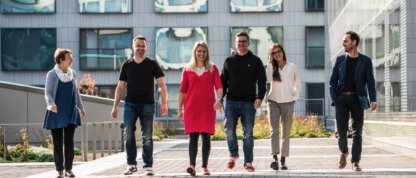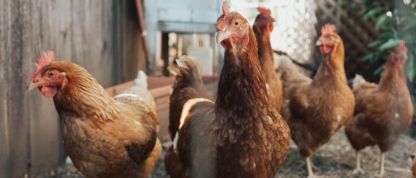
Food industry in transition – Solutions for sustainable food systems

The food industry is continuously looking for ways to reduce greenhouse gas emissions and other solutions to create sustainable food systems. This is reflected in the increasing demand for sustainable solutions from both consumers and legislators. Food companies are currently setting ambitious goals for achieving carbon-neutral food chains. They are also increasingly interested in discovering the carbon footprint of their products as a measurable climate action. To meet the growing demand, we have created an easy-to-use tool for food brands to calculate their carbon footprint and take impactful climate action.
Creating sustainable food systems requires solutions from pioneers
Biocode’s story begun from our founders the Association of ProAgria Centres‘ and Mtech Digital Solutions’ desire to find solutions for sustainable food systems to foster carbon-neutral food production.
So far the team at Biocode have developed custom digital solutions for carbon footprint calculation for our customers.
- The technical implementation of a cloud-based raw milk carbon footprint calculator Carbo, for the leading Finnish dairy and food company Valio.
- Online tools for assessing the carbon footprints of beef, pork and poultry for HKScan, another leading Finnish food company.
- Carbon footprint calculations for the Finnish bakery Vaasan‘s selected bread brands.
- Carbon footprint calculations of oat flakes for Kinnusen Mylly utilising the grain greenhouse gas emissions calculator.
- Assessments for Verso Food’s fava bean brands Härkis and Beanit together with VTT Technical Research Centre of Finland.
👉 Get to know our customer stories
Brilliant to see how food companies are interested in the environmental impacts of their products. It has been great to be involved in enabling our partners’ carbon footprint calculations and to develop our operations together with forerunner companies. It’s been particularly fascinating to observe how calculations based on farm-specific data provide an understanding of the climate impact of primary production and a comprehensive overview of the farm’s production and inputs. An accurate calculation also reveals in a completely new way the significance of different choices made in the production methods.
Biocode’s lead developers Aki Jalkanen and Linda Staffans.
Launching a new online carbon footprint calculator in early 2021
After these pilot projects we realised that the food industry is lacking an effortless, yet reliable way to continuously track the food product carbon footprints. Besides, assessing product carbon footprints on an ad-hoc basis is expensive and time-consuming. Calculations become obsolete quickly and doesn’t make it possible to monitor or verify the developments in company’s climate activities.
To solve this challenge, we are launched a new online service in early 2021. Biocode’s carbon footprint calculator is a cost-effective tool for food brands to reduce and verify the climate impact of their products. The dynamic tool enables product carbon footprint tracking for all items within a company’s product portfolio. The evaluations are based on international ISO standards, IPCC’s guidelines, and the European Commission’s Product Environmental Footprint (PEF) methodology. Calculations enable up-to-date, reliable and primary data-based understanding of a product’s climate impacts throughout its life cycle – all the way from raw material production to the store shelf. Continuous tracking of the carbon footprint make it possible to monitor and influence long-term development of products.
It is surprising to see how much interest there has already been towards the service thus far. The scalability and integrability of the calculator, as well as the user-driven interface minimizes user effort and simplifies a process usually perceived as complex. The solution to be brought to the market enables food companies to discover the carbon footprint of their products at a low threshold. I am confident that our services will develop a broader understanding that shifting to product carbon footprint tracking does not require reckless resources or major investments from the company. What plays a key role in discovering the product carbon footprint is finding a professional partner to collaborate with.
Biocode’s former CTO Joni Rajanen.
The business case for an online product carbon footprint calculator
An online service for tracking product carbon footprints and for communicating the climate impact of food products brings several benefits for food companies:
- Assessing the climate impact of different life cycle stages of a product helps discovering the most significant factors contributing to the product’s carbon footprint. That makes it possible to identify emission hotspots and target efforts to effectively reduce product carbon footprint.
- Continuous carbon footprint tracking enables a performance improvements and helps companies reach their climate goals for positive climate impact.
- Fact-based carbon footprint information supports data-driven decision-making instead of decisions based purely on feelings or statistical estimates.
- Transparency regarding the product carbon footprint and actions to reduce products’ climate impacts increase stakeholder credibility, enhance brand loyalty and bring reputational benefits for a business.
Product carbon footprint tracking supports companies in climate change-related risk management. It prepares for possible future changes, such as tightening legislation or new economic incentives (e.g. carbon tax). It is an excellent way for companies to indicate their climate responsibility and to stand out as a responsible actor. Producing sustainable products improves overall competitiveness in both national and international markets.
Tracking product carbon footprint is of particular interest to companies that have already set climate targets and want to reduce the emissions throughout their value chain. These companies have already internalised that product carbon footprint calculations generate added value for the business and brings benefits for the brand image.
Biocode’s Accounts and Products Manager Laura Ihanainen.
Stay tuned and subscribe to our messages about the climate, food industry and food supply chain



